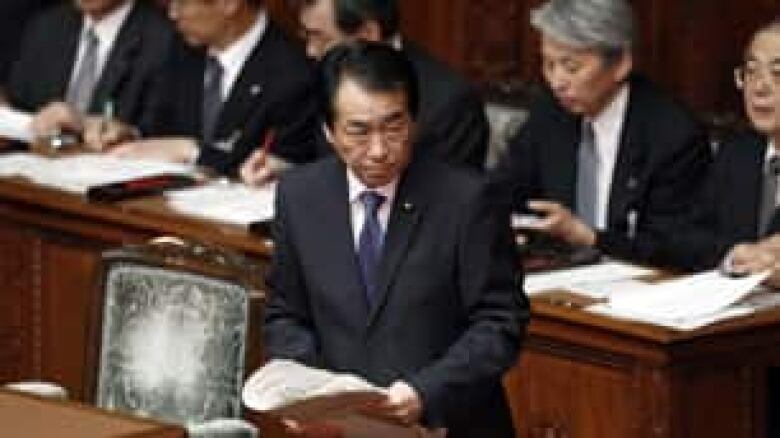Japanese PM warns of debt 'collapse'
Japan could face a financial mess like the one that has crippled Greece if it does not deal urgently with its swelling national debt, the country's new prime minister warned Friday.

While Japan is on firmer financial footing than Greece because most of its debt is held domestically, Prime Minister Naoto Kan's blunt words appeared designed to push forward his austerity agenda, which might involve raising taxes.
Speaking in his first address to parliament after taking office Tuesday, Kan said Japan cannot continue to let government debt swell while state finances are under pressure from an aging and declining population.
"It is difficult to sustain a policy that relies too heavily on issuing debt," he said. "As we have seen with the financial confusion in the European community stemming from Greece, our finances could collapse if trust in national bonds is lost and growing national debt is left alone."
Japan, the world's second-largest economy, has the largest public debt among industrialized nations, equivalent to218.6 per cent of its gross domestic product in 2009, according to the International Monetary Fund.
'Our finances could collapse ' Japanese PM Naoto Kan
Kan, who became Japan's sixth prime minister in four years last week after a short stint as finance minister, promised his government would work closely with the Bank of Japan to avoid an increase in deflation and would focus on developing a "strong and comprehensive" policy.
Kan has said he will also consider raising taxes, an issue he said previous governments had been too timid to face. A social progressive and a fiscal hawk, Kan said he would announce further details of his economic growth plan later this month.
But he said he aims to have the economy grow by more than two per cent annually by fiscal year 2020.
Massive 218 per centdebt
After amassing a vast public debt and overspending to the tune of 13.6 per cent of gross domestic product in 2009, Greece was saved from defaulting on its loans by the first installment of a $131 billionUSrescue package from the International Monetary Fund and the 15 other nations thatuse the euro currency.
Analysts said Kan's cautionary comparison with the recent development in Greece is an overstatement since the Japanese investors who hold the majority of the government's debt are seen as long-term stakeholders who are less likely to bolt for other, more lucrative markets overseas.
"Greece had a huge public debt and huge overseas loans," said Hiromichi Shirakawa, chief economist at Credit Suisse Japan. "Japan has a trade surplus, and it's a major creditor nation ... I don't think Japan's fiscal conditions is facing a similar crisis."
Instead of focusing too much on fiscal tightening, Kan should simply focus on growth strategy that works for Japan's matured economy as the nation's population continues to age and shrink, he said.
Kan's predecessor abruptly quit last week after he failed to keep a campaign promise to move the Marine Corps Air Station Futenma off the southern island of Okinawa.
Kan is enjoying a jolt of public support, with approval ratings of between 60 and 70 per cent boding well for his party heading into next month's elections.
His Democratic Party is considering a July 11 date for the polls, but that has caused a row with their coalition partner, the People's New Party,and prompted its leader, Shizuka Kamei, to announce in the early hours Friday his resignation as postal reform and banking minister.
The junior coalition party wants instead to extend the current parliamentary session to vote on a bill that would scale back the privatization of the post office.












_(720p).jpg)


 OFFICIAL HD MUSIC VIDEO.jpg)
.jpg)



























































































